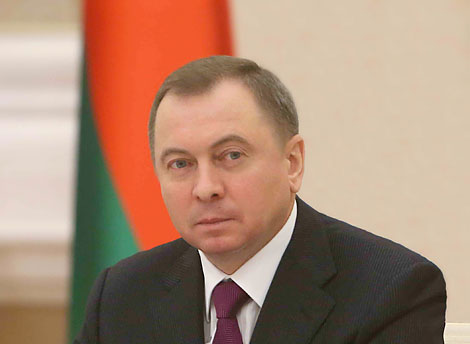Opinions & Interviews
MFA: Belarus seeks to consistently strengthen international peace and security

MINSK, 28 January (BelTA) - Belarus seeks to consistently strengthen international peace and security, and to promote the development of friendly relations between nations, Belarus’ Minister of Foreign Affairs Vladimir Makei said in an address dedicated to the International Holocaust Remembrance Day. The address was read out by Deputy Minister of Foreign Affairs Andrei Dapkiunas at a event in the National Academic Bolshoi Opera and Ballet Theater on 27 January, BelTA has learned.
“In 2005 the UN General Assembly adopted the resolution titled ‘Holocaust Remembrance’ where it designated 27 January as an annual International Holocaust Remembrance Day to commemorate the victims of that tragedy. Belarus, being one of the 104 states that initiated this resolution, together with the world community mourns today victims of the Holocaust. There were six millions Jews as well as Slavs, Roma, people with disabilities and political dissidents killed by the Nazis during the Second World War. We have gathered today to commemorate victims of that unprecedented crime against humanity,” reads the address.
During the war, Belarus lost every third of its citizens and went through all the horrors of the Holocaust. More than 250 death camps and sites of mass extermination of people were created on the Nazi-occupied territory of the country. Among them was the Minsk ghetto, the memory of the demolition of which 75 years ago we will commemorate this fall. On the Belarusian soil, the Nazis executed and killed not only our peaceful citizens - Belarusians and Jews, Russians, Poles, representatives of other nationalities-but also Soviet prisoners of war, underground activists and partisans. The Jewish population from Austria, Germany, Poland and other countries was taken to the Trostenets death camp for extermination.
Belarus has consistently opposed the revival of Nazism and its glorification, attempts of falsification and rewriting of the history of the war. “Unfortunately, painful lessons of the Second World War are not entirely learned by everyone. The world today is full of armed conflicts, hatred and intolerance. Being aware of its responsibility as a founding member of the United Nations, Belarus seeks to consistently strengthen international peace and security, and to promote the development of friendly relations between nations,” the message said.
In the context of growing regional and global tensions the President of the Republic of Belarus put forward the initiative of a new Helsinki process aimed at renewal of a genuine interstate dialogue, consolidation of countries regionally and internationally, in a sincere aspiration to find an effective formula of peaceful coexistence. Belarus is ready to spare no effort in order to facilitate such agreement and mutual understanding.
Today’s event is an opportunity not only to remember the past, but also to think about the future. This is an opportunity to unite around the memory of those who died in the flames of the Holocaust.
Under the guidance of an Israeli conductor the composition “Requiem” by Giuseppe Verdi was performed by the theater orchestra and choir.
The event was attended by ambassadors and diplomats from a number of countries, as well as representatives of state bodies and the Jewish community.







 print version
print version make home page
make home page add to bookmarks
add to bookmarks

